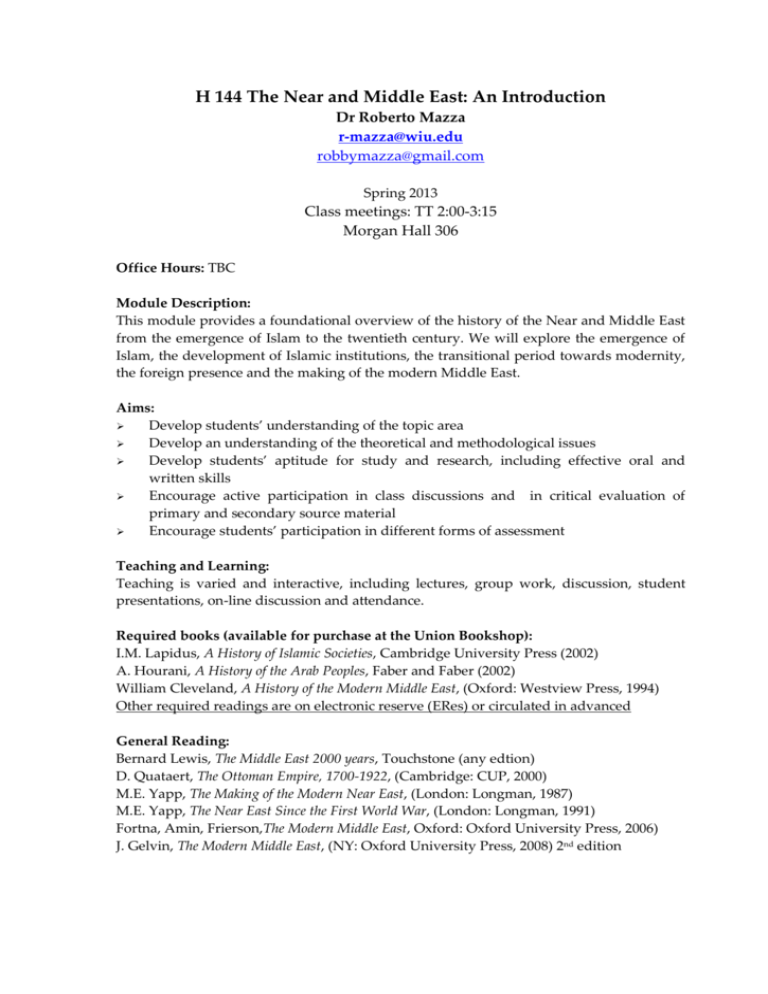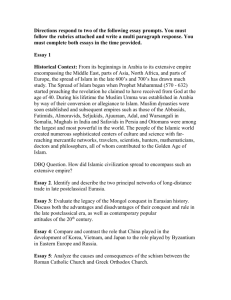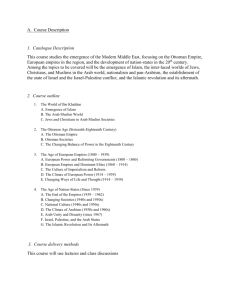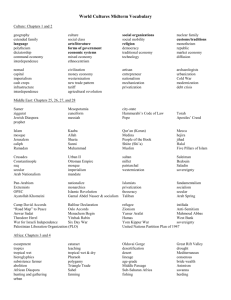Course Title - Western Illinois University
advertisement

H 144 The Near and Middle East: An Introduction Dr Roberto Mazza r-mazza@wiu.edu robbymazza@gmail.com Spring 2013 Class meetings: TT 2:00-3:15 Morgan Hall 306 Office Hours: TBC Module Description: This module provides a foundational overview of the history of the Near and Middle East from the emergence of Islam to the twentieth century. We will explore the emergence of Islam, the development of Islamic institutions, the transitional period towards modernity, the foreign presence and the making of the modern Middle East. Aims: Develop students’ understanding of the topic area Develop an understanding of the theoretical and methodological issues Develop students’ aptitude for study and research, including effective oral and written skills Encourage active participation in class discussions and in critical evaluation of primary and secondary source material Encourage students’ participation in different forms of assessment Teaching and Learning: Teaching is varied and interactive, including lectures, group work, discussion, student presentations, on-line discussion and attendance. Required books (available for purchase at the Union Bookshop): I.M. Lapidus, A History of Islamic Societies, Cambridge University Press (2002) A. Hourani, A History of the Arab Peoples, Faber and Faber (2002) William Cleveland, A History of the Modern Middle East, (Oxford: Westview Press, 1994) Other required readings are on electronic reserve (ERes) or circulated in advanced General Reading: Bernard Lewis, The Middle East 2000 years, Touchstone (any edtion) D. Quataert, The Ottoman Empire, 1700-1922, (Cambridge: CUP, 2000) M.E. Yapp, The Making of the Modern Near East, (London: Longman, 1987) M.E. Yapp, The Near East Since the First World War, (London: Longman, 1991) Fortna, Amin, Frierson,The Modern Middle East, Oxford: Oxford University Press, 2006) J. Gelvin, The Modern Middle East, (NY: Oxford University Press, 2008) 2nd edition Westernonline You will have a WesternOnline companion site available for this course and you must check it regularly as there will be online discussions that are part of your assessment. I will post announcements, lecture notes, calendar, grades, class materials, readings, external links and other useful materials. I also recommend using this tool to communicate with the other students of the course. Take advantage of WesternOnline as it will be your main companion for this course. Coursework and assessment: Letter Grade Mid-term exam Class participation Home assignment 1 Home Assignment 2 Final exam 15% 15% 15% 15% 40% You will be given grades in letter and percentage e.g. A (92%) – B (84%), so you will have a better idea where your grade stands and whether you are closer to the higher or lower mark. Percent Definition of Grade A+ A A- 98% - 100% 93% - 97% Excellent 90% - 92% B+ B B- 87% - 89% 83% - 86% Good 80% - 82% C+ C C- 77% - 79% 73% - 76% Average 70% - 72% D+ D D- 67% - 69% 63% - 66% Passing 60% - 62% Mid-Term Exam. Students are required to answer two (2) questions out of 12 F Below 60% Failing questions covering the topics of week 1 to 8 (70 minutes allowed). Exam questions are drawn from the lectures and class discussions; a revision class will be offered. Make-up will be allowed only after providing legitimate evidence. Day and time of the make-up will be agreed with me. Class Participation Class participation includes attendance, active listening, speaking in class, and performance in class activities (e.g., debate, role playing, group presentation), contribution to the on-line discussion. You must complete the required readings each class session and offer relevant comments during the discussion. You may also raise thoughtful questions of the readings. Home Assignment. Students are required to submit by the end of week 7 and by the end of the last class on week 14 an essay of 1,000 words writing about one of the discussion titles. Late essays will be penalised 2% per working day. Final Exam. Students are required to answer 3 questions out of 16 questions covering the topics discussed throughout the course (2 hours allowed). No make-up exam finals will be allowed. Class policies and notices: On-Line Discussion: We will have occasionally on-line discussions on a variety of topics. Thoughtful, intelligent comments and questions will give you credit for your participation. Do not restate what other have already said and do not simply agree with other people. You can access all discussion through the ‘Discussion’ tab on Western Online. You should plan on contributing to the discussion by Wednesday and replying by Friday. Do not post last minute comments (Saturday-Sunday) to get last minute credit. Depending of the size of the class you may be assigned to a group following the alphabetical order of your family name. Attendance. It is expected students will attend at least 50% of the course. Whereas students will fail to attend at least 50% of the classes, final grade will be penalized; for example, if your final grade is A, you will be given B; if B you will be given C…and so forth. Readings Explanation Required Readings These readings are designed to give you the opportunity to understand better the topics discussed in the lectures and they will also give you more information to be used during class discussions. These readings will be also the most important in your revision for midterm and final exams. I do expect you to prepare these readings before the first class of the week (Monday). Class Discussion These are the readings all students must read in preparation for classes. You are all required to participate actively and to this extent you need to be prepared. If illness or an emergency keeps you from submitting an essay or homework assignment or taking an exam, or to attend classes, please notify the instructor immediately, preferably before the due date of an assignment. Make-ups and extensions will not be scheduled without a written medical excuse or verification of the emergency. You must turn in a hard copy at the start of class on the scheduled due date AND email a copy of your assignment. COURSE POLICIES: 1. Attendance is extremely important in this course. Before coming to class, you are expected to take notes, to understand, and to reflect upon the assigned materials. Failing to attend will affect your final mark (see above). 2. I will circulate the attendance sheet at the start of the class. Failure to sign-in will result in a recorded absence. Students who arrive 15 minutes after class time and who leave class early without consulting the instructor will be considered absent. 3. Excused absences (e.g., due to health and domestic issues) will only be considered upon presentation of supporting documents right after your absence. 4. Please avoid disruptions, such as using cell phones, pagers, and mp3 players inside the classroom. 5. To eliminate problems arising over lost assignments, you must email me a copy of each assignment. Reminder on the University Policy on Academic Integrity The University is committed to the highest standards of academic honesty and integrity. Students are expected to uphold the policies of the University in this respect. Students should familiarize themselves with these policies (http://www.wiu.edu/policies/acintegrity.php) and avoid any behaviour that could potentially result in suspicions of cheating, plagiarism, misrepresentation of facts, and participation in an offence. Academic dishonesty is a serious offence and can result in a mark of zero for an assignment or a grade of F for the entire course. Students must read the Official University Policy Manual for definitions of academic dishonesty (http://www.wiu.edu/policies/acintegrity.php). Plagiarism: No student shall intentionally or knowingly submit the work of another as one’s own. To avoid plagiarism, students should not use another person’s words, ideas, images, or data without proper acknowledgement. Cheating: No student shall intentionally use or attempt to use unauthorized materials, information, notes, study aids, solution manuals, or other devices in any academic exercise, test, or quiz. Special Needs In accordance with University policy and the Americans with Disabilities Act (ADA), academic accommodations may be made for any student who notifies the instructor of the need for an accommodation. For the instructor to provide the proper accommodation(s) you must obtain documentation of the need for an accommodation through Disability Resource Center (DRC) and provide it to the instructor. It is imperative that you take the initiative to bring such needs to the instructor's attention, as he/she is not legally permitted to inquire about such particular needs of students. Students who may require special assistance in emergency evacuations (i.e. fire, tornado, etc.) should contact the instructor as to the most appropriate procedures to follow in such an emergency. Contact Disability Resource Center (DRC) at 298-2512 for additional services. Library and study skills resources: A tour of the library will be arranged in order to discuss the sources available in the study of the history of the Middle East. Other sources available will be discussed in class. Further Information: Do not hesitate to contact me, however note that I will not reply to emails during the week end unless clearly concerning urgent matters. Course Content: Week 1: Defining the Middle East This class will help students to define the object of the course in its geographical, temporal and methodological definition. Major historiographical debates will be discussed as well as the major issues surrounding the region. Required Reading: Peter Mansfield, A History of the Middle East, (New York: Penguin Books), p. 1-13 Colbert Held, Middle East Patterns, (Boulder: West View Press), Ch. 1, 6 http://teachmiddleeast.lib.uchicago.edu/foundations/geography/image-resourcebank/index.html (maps and pictures - link on western online) Week 2: Muhammad and the Rise of Islam This class will discuss the figure of Muhammad and the Arab conquest and Islamicisation of the Arabian Peninsula and beyond. It will be discussed the particular issue of sources available to study this particular historical period. We will discuss also the question of sources. Required Reading: G. Hawting. ‘The Rise of Islam’, in A Companion to the History of the Middle East, ed. By Youssef Choueiri Ira Lapidus, History of Islamic Societies, (Cambridge, CUP, 2002), Ch. 1, 2, 3. John Esposito (ed), The Oxford History of Islam, 1-27 (Western on-line) Fazlur Rahaman, Islam, (Chicago: University of Chicago Press, 1979), Ch. 1. Hugh Kennedy, The Great Arab Conquest, (Philadelphia: DaCapo Press, 2007), Ch. 1. Discussion/Essay Title: Seminar/Essay Title: How can we study the Middle East? What are the problems with Middle Eastern history? A.L. Macfie, Orientalism a Reader, (New York: NYU Press, 2000), Ch. 12, 26 Week 3: Institutions of Government and Religion This class will discuss and analyse the historical development of political and religious institutions after the Arab conquest of the Middle East. We will discuss in depth key concepts like caliphate, ulama and iqta. Required Reading: Hugh Kennedy, ‘The Caliphate’ in A Companion to the History of the Middle East Ira Lapidus, History of Islamic Societies, Ch. 4. Albert Hourani, History of the Arab Peoples, Ch. 4. John Esposito, The Oxford History of Islam, 27-43 (Western on-line) Encyclopaedia of Islam: Khalifa, Ulama. (Western on-line) On-line Discussion/Essay Title: To what extent Iqta and Feudalism are different and/or similar? Explain your own view. Ira Lapidus, History of Islamic Societies, Ch. 8, 9. Bernard Lewis, The World of Islam, p. 38-39 (Western Online) Encyclopaedia of Islam: Iqta, Atabeg (Western Online) Week 4: Types of Islam This class will discuss the main split and the main differences in Islam between Sunnis and Shi’is traditions. In this class we will also look at some sources looking at the modern split between Shia and Sunni. Required Reading: Robert Gleave, ‘Shi’ism’ in A Companion to the History of the Middle East Ira Lapidus, History of Islamic Societies, Ch. 6, 10. Albert Hourani, History of the Arab Peoples, Ch. 11. John Esposito, The Oxford History of Islam, 44-49 (Western on-line) John Esposito, The Oxford History of Islam, 63-90 (Western Online) Fazlur Rahman, Islam, Ch. 8. Discussion/Essay Title: What is ethnicity? What aspect of Identity is most important for many Muslims, ethnicity or religion? Ibrahim, V, "Ethnicity" in The Routledge Companion to Race and Ethnicity, (Western Online) Kedourie, E "Ethnicity, Majority and Minority in the Middle East" in Ethnicity, Pluralism and the State in the Middle East, (Eds) Seman and Rabinovich (Western Online) Week 5: Culture and Society This class will provide an overview of culture and society in the Middle East in the period of Classical Islam. Cultural institutions, ideas, movements and individuals will be discussed in order to highlight the diversity within the Islamic world. Required Reading: Ira Lapidus, History of Islamic Societies, Ch. 5, 6, 7. Albert Hourani, History of the Arab Peoples, Ch. 12. Richard Ettinghausen “The Man-Made Setting” in The World of Islam (Western on-line) Encyclopaedia of Islam, (Western Online, Brill: 2002): Dhimma On-Line Discussion/Essay Title: Women in Islam and the Middle East: reasons for a misinterpretation. How women traditionally played an important role in Middle Eastern society? Ruth Roded, Women in Islam and the Middle East, Ch. 1,2,12 and Epilogue (Western on-line) Leila Ahmed, Women and Gender in Islam, Ch. 3,8,11. Watch the short documentary before discussion – it is a very controversial video - The Global Liberation of Women http://www.youtube.com/watch?v=r87MpEgPTwI (YouTube) Week 6: Regionalisation vs. Centralisation of political authority This class will provide an overview of the political history from 1000 to 1500 focussing on the largest political processes and the arrival of new actors in the Middle East: Fatimids, Mamluks, Mongols and Crusaders. In this class we will also re-assess the age of the crusades and their legacies. Required Reading: P.M. Holt, ‘The Mamluk Institution’ in A Companion to the History of the Middle East Ira Lapidus, History of Islamic Societies, Ch. 13, 14 , 15. Albert Hourani, History of the Arab Peoples, Ch. 5. Time to think about your home assignment. After readings the suggested material, ask any question and share your concerns. General Advice on Essay Writing (Link on Western Online) Chicago Style Footnotes (Link on Western Online) Basic Rule for Essay Writing (File on Western Online) Undergraduate Essay Criteria (File on Western Online) On-Line Discussion/Essay Title: Why were the Crusades so successful in conquering lands in the Middle East? Encyclopaedia of Islam,: Crusades (Western on-line) Carole, Hillenbrand, The Crusades: an Islamic Perspective, Ch. 1,9 Christopher Tyerman, The Crusades: a Very Short Introduction, (Oxford: Oxford University Press, 2005), Ch. 1, 4, 5, 7. John Esposito, The Oxford History of Islam, Ch. 7 (Western Online) Week 7: Islam in Europe This class will discuss the expansion of Islam in Europe (Spain and Italy) looking at the relationship of the new rulers with the local population and how Islam, Christianity and Judaism created a system which was based on tolerance and co-operation. This class will also look at the end of the Islamic rule in Europe with the Reconquista of the 15th century. Required Reading: The Cambridge History of Islam, Vol. 2A, Ch. 7 Ira Lapidus, History of Islamic Societies, Introduction Part II and Ch. 16 (309-319) Bernard Lewis, The World of Islam, Ch. 9 (Western on-line) Discussion/Essay Title: To what extent Western science and culture are the outcome of the encounter with Islam? Howard Turner, Science in Medieval Islam, (Austin: University of Texas Press, 1997), Ch. 3, 5, 9, 13, 14. John Esposito, The Oxford History of Islam, Ch. 4 (Western Online) BBC Video on Science and Islam Available on Youtube in 6 parts Home Assignment 1 Due (Thursday) Week 8: Elites, Commoners, Trades and Crafts This class will discuss various social, economic and cultural issues in medieval Middle East. This class will be instrumental to understand the meeting between Middle Eastern societies and Europe in the following centuries. Required Reading: Ira Lapidus, History of Islamic Societies, Ch. 9, 11, Conclusion Part I. Albert Hourani, History of the Arab Peoples, Ch. 6, 7. Bernard Lewis, The World of Islam, Ch. 3 (Western on-line) Oleg Gabrar “Cities and Citizens” in The World of Islam (Western on-line) Review in preparation for the Mid Term Exam Week 9: The rise of the Gunpowder Empires: overview 1500-2000 This class will study the rise of new powers in the region: the Safavid and the Ottoman Empires. It will be discussed their origins and socio-political developments. Required Reading: Albert Hourani, History of the Arab Peoples, Ch. 13. Bernard Lewis, The Middle East 2000 years, Ch. 7 John Esposito, The Oxford History of Islam, Ch. 8 (Western Online) MID TERM EXAM (THURSDAY 70 MINUTES) Week 10: ‘The Golden Age’ in the Ottoman and Safavid Empires This class will discuss the florescence of the Ottoman and Savafid Empire, at the same time highlighting the emerging problems. Beside the concepts of ‘Golden Age’ and ‘Decline’ will be discussed and assessed as valuable terms in studying the history of the Middle East. We will look at the legendary figure of Sulyeman the Magnificent Required Reading: Metin Kunt, ‘Ottomans and Safavids’ in A Companion to the History of the Middle East Justin Mc Carthy, The Ottoman Turks, Ch. 3 Marshall Hodgson, The Venture of Islam, Vol. 3, Ch. 1 Ira Lapidus, History of Islamic Societies, Ch. 14. Discussion/Essay Title: What is meant by ‘Golden Age’? The Ottoman and Safavid Empires Watch the video on YouTube ‘A Call For a Global Islamic Village’ http://www.youtube.com/watch?v=BMkjsqjV2lY (Link on Western Online) Justin Mc Carthy, The Ottoman Turks, Ch. 4 Week 11: The age of Reforms This class will provide an overview of the historical development of the Middle East from 16th to 19th century. The focus will be placed on the encounter with the wider world and the question of the Ottoman ‘decline’ and the attempts to revert the parable of the Ottoman Empire. Required Reading: William Cleveland, A History of the Modern Middle East, Ch. 4, 5. Albert Hourani, History of the Arab Peoples, Ch. 15, 16. Ilan Pappe, The Modern Middle East, Intro. (1-14) Discussion/Essay Title: How did the region enter the modern era in the 19th and 20th centuries? How useful is the concept of modernity in studying the Middle East? Ira Lapidus, History of Islamic Societies, Intro Part III. James Gelvin, The Modern Middle East, Ch. 5 Week 12: The First World War in the Middle East and Colonialism This class will discuss the involvement of the Middle East in the First World War and the various outcomes the conflict had upon the region. It will be discussed the extent the First World War produce the ‘modern’ Middle East. It will be also discussed the issue of ‘colonialism’ in the region after the conflict. Required Reading: Albert Hourani, History of the Arab Peoples, Ch. 19, 20. Ira Lapidus, History of Islamic Societies, Ch. 23 S. Hanioglu, A Brief History of the Late Ottoman Empire, 167-177 On-Line Discussion/Essay Title: What is your understanding of the Balfour Declaration? Balfour Declaration text (Western Online) James Gelvin, The Modern Middle East, Ch. 14 William Cleveland, A History of the Modern Middle East, p. 239-244 Mark Levene, ‘The Balfour Declaration: a Case of Mistaken Identity’ (On Jstor or Western Online) Week 13: Nationalism and its ‘Others’ This class will define the concept of Nationalism in relation to the Middle East in the late 19th century and how it developed in the 20th century. It will be discussed how Nationalism proved to be a successful ideology in the 20th century. It will also be discussed how Nationalism was used by various political actors in order to take power after the demise of ‘colonialism’. Required Reading: Youssef Choueiri, ‘Nationalism in the Middle East’ in A Companion to the History of the Middle East Albert Hourani, History of the Arab Peoples, Ch. 18, 22. William Cleveland, A History of the Modern Middle East, Ch. 7. James Gelvin, The Modern Middle East: a History, Ch. 5 Discussion/Essay Title: Define briefly Nationalism and discuss the assertions of National Identities in the Middle East R.G. Landen, The Emergence of the Modern Middle East, (London: Van Nostrand, 1970), p. 211-235. James Gelvin, The Modern Middle East: a History, Ch. 13 Benedict Anderson, Imagined Communities, Intro, Ch. 2 Week 14: Independence and Revolution This class will discuss the major changes that took place in the second part of the 20th century in the region. The focus will be placed on the process of transformation that brought the Middle Eastern countries from ‘colonial’ rule to independence and then it will be discussed the internal situation of these new countries and the various political revolutions that took place. Required Reading: William Cleveland, A History of the Modern Middle East, Ch. 15, 16, 20. Albert Hourani, History of the Arab Peoples, Ch. 24. Ira Lapidus, History of Islamic Societies, Ch. 26. James Gelvin, The Modern Middle East, Ch. 14 Discussion/Essay Title: What is your understanding of the Palestinian-Conflict? Why the US is so involved in this particular conflict? James Gelvin, The Modern Middle East, Ch. 17-18 Avi Shlaim, The Iron Wall, Ch. 1 Ilan Pappe, The Ethnic Cleansing of Palestine, Ch. 1-2 Home Assignment 2 Due (Thursday) Week 15: The Middle East in the contemporary World This class will discuss some of the events that took place in the 1980s and 1990s in the Middle East using as much as possible a historical approach, providing the students with some tools in order to assess and discuss contemporary events. Required Reading: William Cleveland, A History of the Modern Middle East, Ch. 17, 18, 24 James Gelvin, The Modern Middle East: a History, 223-246 Exam Revision








